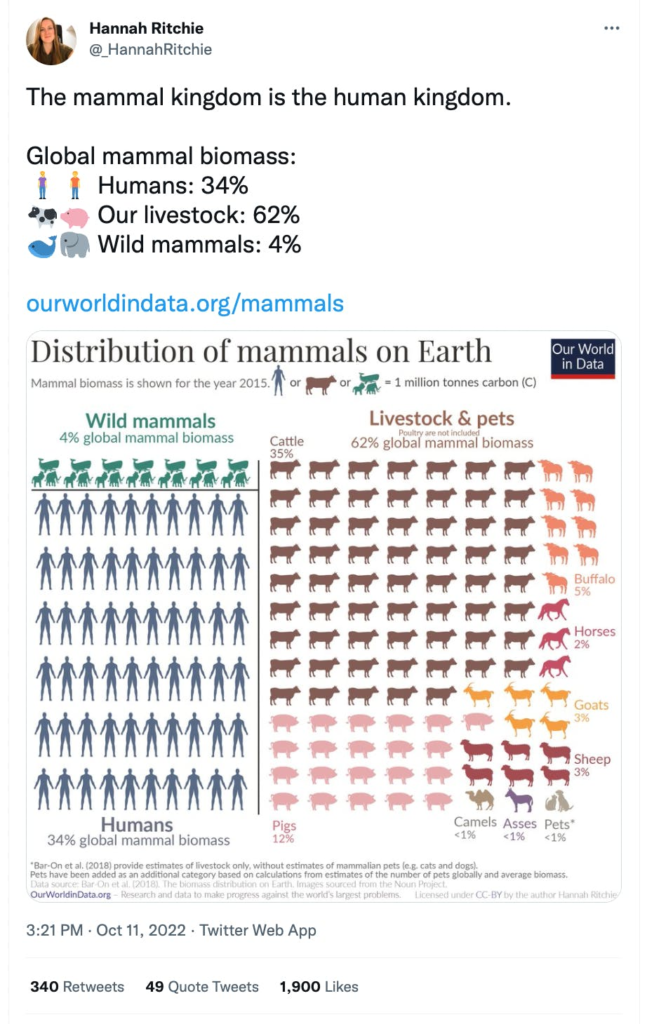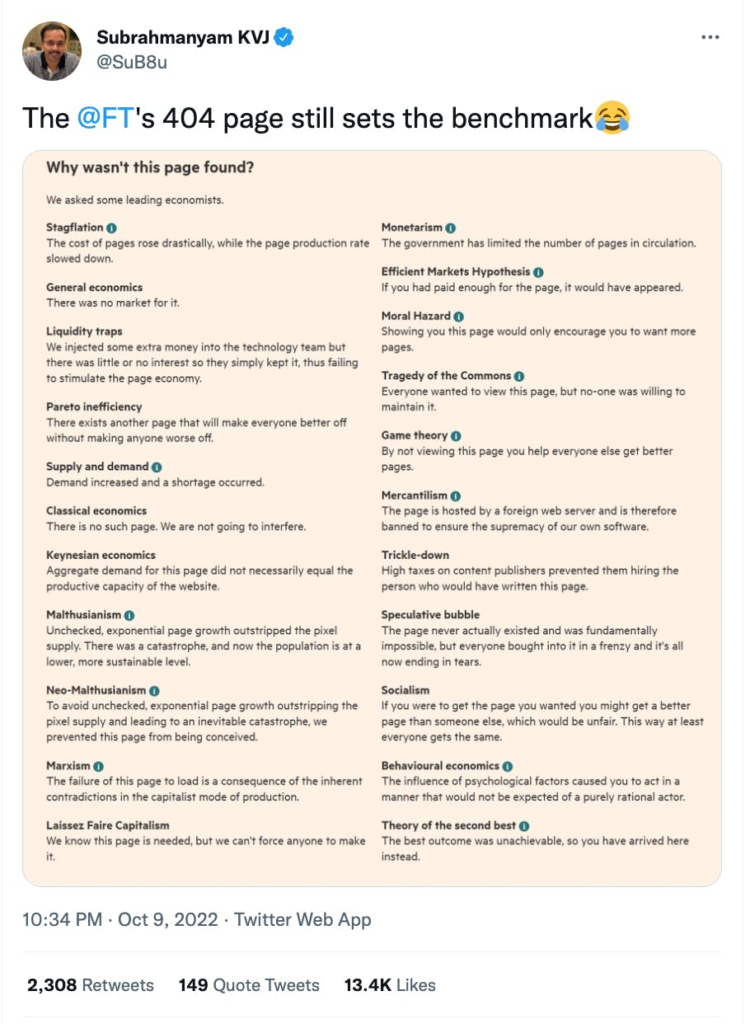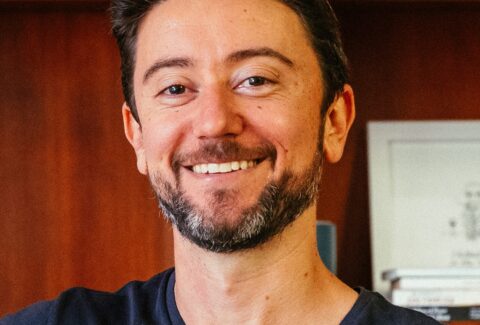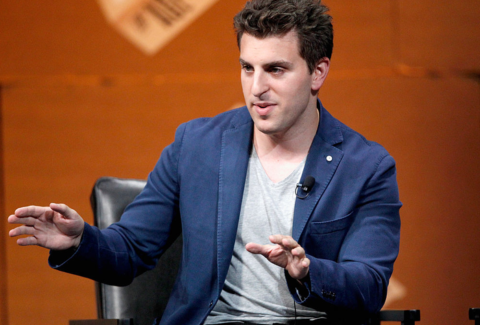Can you distil your field into its core beliefs?
This week’s main article is one by Morgan Housel on distilling the core beliefs of your field.
📄 Article/s of the week
a. Big Beliefs by Morgan Housel
Can you distill the hard-earned wisdom of your area of work into a handful of core insights?
In this post, Morgan condenses his “big beliefs” about the psychology of money and investing into 10 counter-intuitive ideas.
These include ideas such as:
Sitting still feels reckless in a fast-moving world, even in situations where it offers the best odds of long-term compounding. It’s like being told that you should play dead if a grizzly charges you – running for your life just feels more practical. The bias towards action is one of the strongest forces in business investing for three reasons: It can be the only signal to yourself and others that you’re not oblivious to risks. It can be the only signal to others that you’re worth your salary. And it can provide the illusion of control in a world where so much is out of your hands.
And:
Stories are more powerful than statistics, because they’re easier to understand and contextualize to your own life. The person who tells the most compelling story wins. Not who has the best idea, or the right answer. Just whoever tells a story that catches people’s attention and gets them to nod their heads.
And this one:
As Aldous Huxley writes, “Man has an almost infinite capacity for taking things for granted.” The goalposts of success constantly shift. A new innovation can go from unfathomable luxury to baseline necessity in a few months. So progress is always a step ahead of contentment. That fuels the need to keep innovating, which is great. But it creates a world where people who are exponentially better off than their ancestors have little added happiness to show for it.
Hat/tip: Gururaj Sundaram
P.S.: I should attempt a list like this for the craft of storytelling!
b. Expectations (Five Short Stories) by Morgan Housel
It’s a Morgan Housel double-bill this weekend. This post shares 5 fascinating stories about expectations – and how they have such a massive influence on our happiness.
I’d heard the equation “Happiness = Reality – Expectations” on a podcast episode once (IIRC it featured Tim Ferriss) . It is amazing how, despite our improving ‘reality’, we struggle to remain happy because of ever-increasing expectations.
Consider what might be considered as one of the pinnacles of human achievement – the moon landing. You might be thinking that the folks who went there would still be basking in the (cool) afterglow of the moment. Not really.
Apollo 11 was the first time in history humans visited another celestial body.
You’d think that would be an overwhelming experience – literally the coolest thing any human had ever done. But as the spacecraft hovered over the moon, Michael Collins turned to Neil Armstrong and Buzz Aldrin and said: “It’s amazing how quickly you adapt. It doesn’t seem weird at all to me to look out there and see the moon going by, you know?”Three months later, after Al Bean walked on the moon during Apollo 12, he turned to astronaut Pete Conrad and said, “It’s kind of like the song: Is that all there is?” Conrad was relieved, because he secretly felt the same, describing his moonwalk as spectacular but not momentous.
Most mental upside comes from the thrill of anticipation – actual experiences tend to fall flat, and your mind quickly moves on to anticipating the next event. That’s how dopamine works.
If walking on the moon left astronauts underwhelmed, what does it say about our own earthly goals and expectations?
The part about the ‘thrill of anticipation’ rings particularly true. So, we have been looking to buy a car for some time now. Over the past few months I have spent innumerable happy hours on TeamBHP and YouTube “researching” endlessly and dreaming about our next ride.
After many months, we finally took the decision and completed the formalities. And instead of unbridled joy, I am left with a vague bittersweet feeling. The kind that you may have at the end of a joyful theme park ride.
Our brains seem to chemically reward anticipation more than the actual event.
Expectations also work in funny ways. Take this story about a woman who was given the most precious gift of sight.
Dr. Dan Goodman once performed surgery on a middle-aged woman whose cataract had left her blind since childhood. The cataract was removed, leaving the woman with near-perfect vision. A miraculous success.
The patient returned for a checkup a few weeks later. The book Crashing Through writes: “Her reaction startled Goodman. She had been happy and content as a blind person. Now sighted, she became anxious and depressed. She told him that she had spent her adult life on welfare and had never worked, married, or ventured far from home – a small existence to which she had become comfortably accustomed. Now, however, government officials told her that she no longer qualified for disability, and they expected her to get a job. Society wanted her to function normally. It was, she told Goldman, too much to handle.”
Every goal you dream about has a downside that’s easy to overlook.
Our happiness is in our mind.
c. When the Hindu Right Came for Bollywood by Samanth Subramanian
Religion and politics are extremely tricky areas to talk about – and I am aware of how little I know about them.
Every story has several sides and this is one side that you should read. Samanth is meticulous in his research, and does a great job of collating several disparate instances and examples of the increasing conservative, right-wing bias in Hindi cinema.
It is a disturbing read and makes you worry about the second and third order implications.
Having said that, I’d love to read thoughtful, data-backed counterpoints – please share them if you come across any.
🎧 Podcast episode/s of the week
a. ‘Outliers, Revisited’ by Revisionist History (Malcolm Gladwell)
In his bestselling book, ‘Outliers’, Malcolm Gladwell had pointed out to a curious phenomenon that explained why some kids got selected to elite sports teams vs others.
It was not their athleticism, their upbringing, or even their height/weight. It was just the month of their birth.
Since sports teams have an age cutoff for selection, Malcolm’s finding was that kids who were relatively older within that one year range were overwhelmingly likely to be chosen – since they were that many months ahead in their physical and mental development.
And so, instead of the players’ birth months being evenly distributed across the year, the book mentions the 40:30:20:10 effect:
In any elite group of hockey players, the very best of the best 40% of the players will have been born between January and March, 30% between April and June, 20% between July and September, and 10% between October and December.
This is because Canada is obsessed with hockey and coaches start picking players for all star traveling squads at the age of nine or 10. Since the eligibility cutoff for Canadian hockey is January 1st, that means the coaches are choosing among nine year olds who are as much as 12 months apart. And 12 months age difference at the age of nine is a lot.
The January kids are bigger and stronger and more coordinated than the December kids, which means that the January kid is more likely to be chosen by the coaches for the traveling squad, which means in turn that they will practice two or three times as often, play more games, have better coaches, better competition than the kids left behind.
And what began as a completely arbitrary advantage based on a quirk of birthdays, turns over time into a real advantage.
In this podcast episode, Malcolm applies this same concept to admissions in elite Ivy League schools. He visits Wharton at the University of Pennsylvania and tries to make a group of college kids aware about their special privilege: their birth month.
There is a cutoff age for applying to Wharton too – and the range is higher at 2 years. Not surprisingly, most kids are at the higher end of that range. Age does matter.
A clear implication – do not push your child through school too early.
But then, that may lead to an age arms race:
I cannot tell you how many parents have come up to me over the years and said, because I read your book ‘Outliers’, I held my kid back from starting school and it was the best decision I ever made. Of course it was. But parents holding their kids back doesn’t solve the problem. It just creates a relative age effect arms race. There’s a fancy private school near me where so many parents of younger children have held their kids back that now the parents of the formerly eldest children have responded by holding their kids back. Where upon the first set of parents are increasingly holding their kids back a second time, meaning that there is at least the theoretical possibility that in the most competitive corners of American private education, some kids may never graduate from high school.
So what can we do about this? Malcolm advocates for a different testing mechanism – one that is not based on age cutoffs on some arbitrary date of the year, but one that adjusts for different maturity.
In Australia, they’ve invented something called maturity based corrective adjustment procedures: MAT-CAPs, as it’s known. For provisional use in the sport of swimming…
It turns out that if you take a bunch of measurements of kids and plug them into an equation, you can estimate their physical maturity quite accurately.
So you don’t have to rely on chronological age to assess someone’s level of development. You can do one better and measure maturity directly.
Prof Steven Cobley: “So what these equations do is they factor in, uh, indices like height, weight, chronological age and sitting height. And they use those factors to then estimate how far away a particular individual is from that point of peak growth.”
The MAT-CAP sounds like an interesting system. But I’m sure it has its own avenues of being gamed.
Still, whether or not the MAT-CAP is the right solution, the podcast episode makes one thing clear: There is a problem!
🐦 Tweet/s of the week
This is eye-opening. 35% of global mammal biomass is from… cows!

This is so clever – although I didn’t get most of the economic theory!

I like this guy!

💬 Quote of the week
“Our capacity for fretting is endless, and no matter how many difficulties we surmount, how many ideals we realize, we shall always find an excuse for being magnificently miserable.”
– Will & Ariel Durant referenced from this tweet by Tim Urban
📹 Video of the week
a. ‘Why Cities With Grids Are Terribly Designed’ by OBF (8:28)
Ok, so that is a clickbait-y title, but the video is interesting.
I visited the US in 2014 and was completely taken by the grid-based city architecture. I love order and found the predictability and ease of navigation liberating.
Of course that design comes with its own pitfalls. Watch this video to find out about the origin of grid based cities and their challenges.
That’s it folks: my recommended reads, listens and views for the week.
Take care and stay safe.
Image by Frank Liebmann from Pixabay







